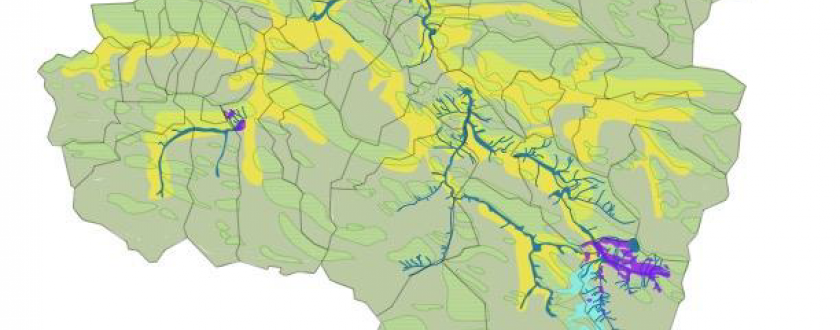Territorial Climate-Air-Energy Plan (PCAET) 2050, Communauté de Communes Couserans Pyrénées
Description of the case study
The Couserans Pyrénées PCAET is a strategic and operational regional sustainable development project which puts the spotlight on climate, pollution and energy problems as a whole and examines five basic lines of action: reducing greenhouse gas emissions, climate change adaptation, energy efficiency, air quality and renewable energy development.
The PCAET encompasses five development phases (diagnostics, regional strategy design, action and monitoring programme, environmental assessment) and is currently (2018) at the beginning of the regional strategy design phase.
The PCAET is a comprehensive tool which takes a global and multi-sectoral approach to regional action. The administrative nature of the tool—being the product of an alliance between municipalities—as well as its cross-cutting approach (climate and energy) render it a powerful hub for mobilising stakeholders and resources to tackle climate change and to adapt the different administrative and socio-economic sectors to the already-present effects of this phenomenon.
The main objectives of the Couserans Pyrénées PCAET are as follows:
- Launch an ambitious and cross-cutting air, energy and climate policy.
- Raise awareness of the challenges of transitioning to sustainability and encourage good practices.
- Limit atmospheric pollution.
- Support carbon sequestration in the agricultural sector.
- Limit the use of polluting motorised vehicles and optimise commercial transport in the comarca.
- Encourage businesses to implement sustainable development strategies.
- Reduce the region's energy expenditure.
- Support local renewable energy projects.
- Promote local and sustainable food.
- Boost circular economy projects.
- Encourage stakeholders in the region to get ahead of climate change adaptation.
- Limit the exposure of the population to the natural risks linked to climate change.
The plan comprises several development phases and is currently (2018) at the end of the diagnostic phase moving into implementation of a regional strategy. In this context, the climate change adaptation actions set out in the project are as follows:
- Develop a four-season tourism development strategy for the entire comarca.
- Preserve water resources.
- Design a strategy for managing the natural risks linked to climate change.
Case study developed, implemented and partly funded as a climate change adaptation measure.
Communauté de Communes Couserans Pyrénées, Agence de l'Environnement et de la Maitrise de lÉnergie, Parc Pyrénées Ariégeoises Regional Natural Park, the French department of Ariège and Occitanie region.
Additional Information
As the supramunicipal organisation with responsibility for implementing the PCAET, the Communauté de Communes Couserans Pyrénées is developing a participative process to involve all regional stakeholders in the diagnostic, design, implementation and assessment phases of the PCAET. Some of these key stakeholders are the Agence de l'Environnement et de la Maitrise de lÉnergie, Parc Pyrénées Ariégeoises Regional Natural Park, the French department of Ariège and Occitanie region.
| Success: Occitanie is a pioneering region in the fight against climate change. Some 20% of farms in the region affected are organic, forest coverage in the area has doubled over the last 100 years and the PCAET is at the beginning of its implementation phase.
Limiting: innovative socio-economic development is limited in the region due to an ageing primary sector and uncertainty; natural risks are a very real threat in the region (floods, landslides and fires). |
Not included.
The PCAET has been put together under legal mandate from the French Ministry of the Environment, Energy and the Sea, in accordance with the provisions of Decree 2016-849 of June 28th 2016 on the regional climate, air and energy plan. The specific objectives of the latter include climate change adaptation in the region.
2018-2024 (7 years - in progress)
Reference information
PYRENEAN CLIMATE CHANGE OBSERVATORY
Avenida Nuestra Señora de la Victoria, 8
22.700 - Jaca
Huesca - España
+34 974 36 31 00
info_opcc@ctp.org






